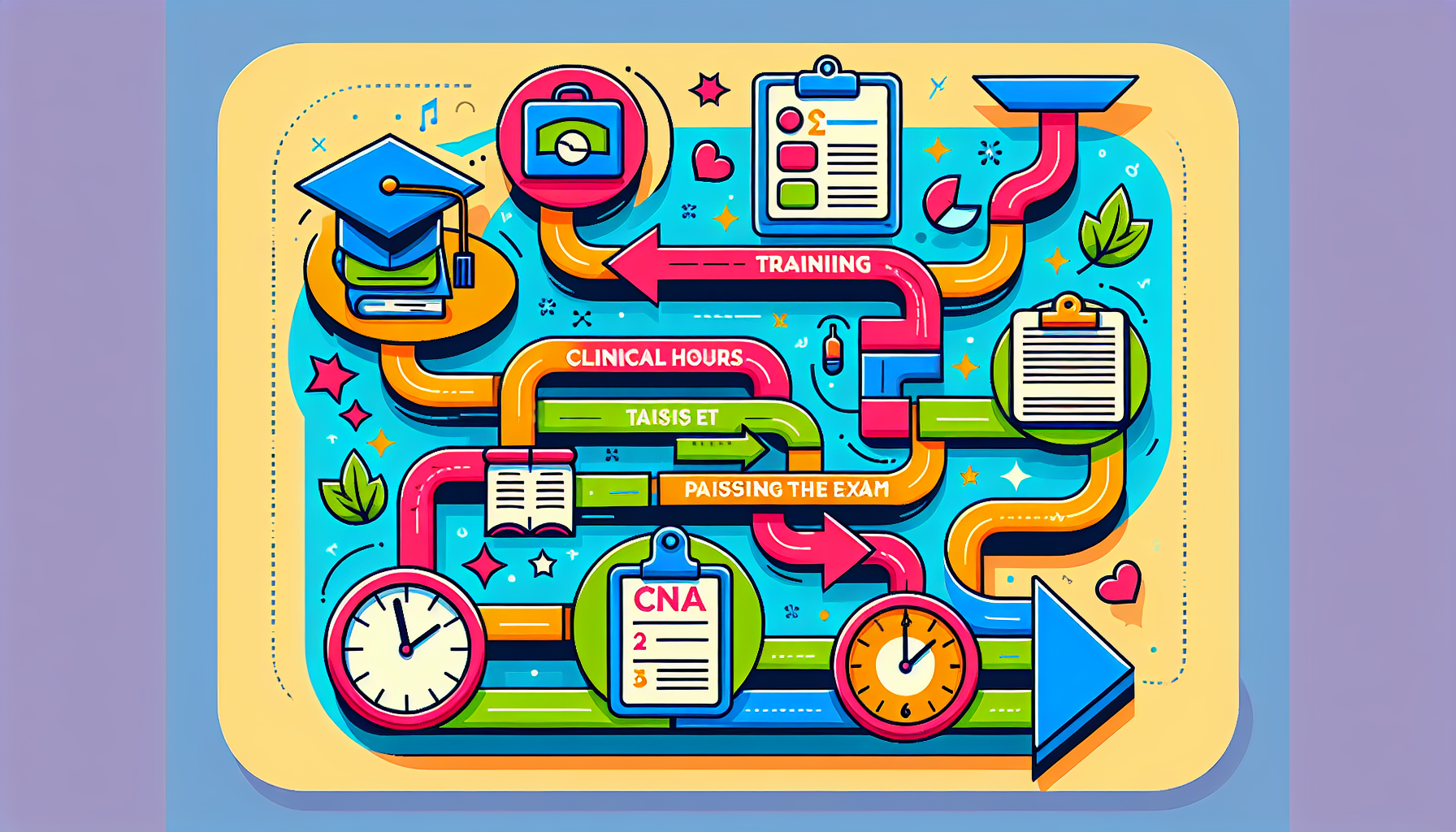Best Guide on How to Become CNA Quickly and Efficiently
Wondering how to become CNA? To become a Certified Nursing Assistant, you need to understand the role, meet educational requirements, complete training, and pass the CNA exam and certification exams. In this article, we will walk you through how to become CNA at each step of the process.
Key Takeaways
- CNAs are essential in healthcare, providing vital patient care and supporting nursing staff in various settings such as hospitals, nursing homes, and home healthcare.
- To become a CNA, individuals must complete state-approved training programs, pass a CNA exam and certification exam, and can benefit from financial assistance options to manage costs.
- The demand for CNAs is projected to grow, with numerous job openings anticipated each year, making it a stable and rewarding career choice with competitive salary expectations.
Understanding the Role of a Certified Nursing Assistant

Certified Nursing Assistants (CNAs) are vital to the healthcare industry, providing essential support to both patients and nursing staff. They care for patients who are infirm, ill, or injured, and assist those who are disabled. Their duties include checking vital signs, helping with daily activities, and ensuring patient comfort and safety. The hands-on care provided by a certified nurse assistant and medical assistant makes them indispensable in healthcare settings.
For those considering a career as a CNA, it’s important to know that CNAs undergo more training and certification than Nurse Aides and have distinct roles compared to Medical Assistants, Licensed Practical Nurses (LPNs), and registered nurse.
Recognizing the responsibilities and environments where CNAs work helps in appreciating their role in providing quality patient care.
Key Responsibilities of CNAs
CNAs have essential responsibilities that ensure patient care and the smooth operation of healthcare facilities. They assist with basic care, monitor vital signs, and support nursing staff. Helping patients with hygiene, mobility, and daily activities addresses needs related to illness, injury, and disability, making their hands-on approach critical in healthcare.
Familiarity with medical terminology is required for CNAs to communicate effectively with other healthcare professionals. Teamwork is fundamental as they collaborate closely with nurses, doctors, and other staff to deliver comprehensive patient care.
Performing daily tasks like taking vital signs and assisting with mobility, combined with strong communication skills, makes CNAs indispensable.
Work Environments for CNAs
CNAs work in diverse healthcare settings, each with unique experiences and challenges. Common environments include hospitals, nursing homes, assisted living facilities, and home healthcare. Additionally, CNAs support patients in hospices, private doctors’ offices, urgent care centers, and community clinics, showcasing the role’s versatility.
The wide range of work environments means CNAs play a crucial role in various healthcare settings, delivering care to diverse patient populations. Whether in a hospital, nursing home, or community clinic, CNAs provide vital hands-on care and support.
This flexibility enables CNAs to select work settings that align with their skills and interests, making it an appealing career choice.
Educational Requirements for Becoming a CNA

Becoming a Certified Nursing Assistant (CNA) involves meeting certain educational requirements. While many institutions require a high school diploma or GED, Northeast Medical Institute offers a CNA program that does not, making it accessible to more individuals. This provides a unique opportunity for those looking to enter the healthcare field quickly.
CNAs usually obtain a postsecondary non-degree certificate or diploma after their training. Some states allow enrollment in CNA training programs while still in high school, enabling an early start in healthcare careers.
Prospective CNAs must understand these educational requirements to ensure they meet the criteria for certification and employment. After completing the educational requirements, candidates must pass the CNA exam to become certified.
High School Preparation
High school preparation can lay a strong foundation for a successful CNA career. Though a diploma or GED is not required for CNA training at Northeast Medical Institute, a solid educational background is beneficial. High school students interested in healthcare can take courses in biology, anatomy, and health sciences to prepare for future training.
Many schools offer opportunities for volunteer work or internships in healthcare settings. These experiences provide valuable insights and help students develop essential skills like empathy, communication, and teamwork.
Even without a diploma requirement, high school preparation can still benefit those aiming to excel in CNA training and future careers.
CNA Training Programs
CNA training programs are available at various institutions, including independent training schools, community colleges, nursing homes, hospitals, and home health agencies. State-approved programs are also available online, offering flexibility for different schedules and commitments. These programs vary in duration from a few weeks to several months, with full-time and part-time options.
The Northeast Medical Institute offers a hybrid CNA training program combining self-paced online theory with flexible lab and clinical experiences. This allows students to complete the online portion at their own speed, making it appealing for those with busy schedules or other commitments. These programs prepare students for the CNA exam, which is a crucial step in becoming certified.
Offering a mix of online and in-person training, the Northeast Medical Institute provides comprehensive education and hands-on experience, preparing students for successful CNA careers.
Steps to Achieving CNA Certification

Achieving CNA certification involves several steps, beginning with enrolling in a state-approved training program and passing the state certification exam. This process ensures CNAs have the knowledge and skills to provide high-quality patient care. Completing a training program and gaining hands-on experience through clinical hours are crucial parts of this path.
Choosing the right training program is essential, as it must meet state certification requirements and prepare students for the CNA exam. Programs like those at the Northeast Medical Institute offer comprehensive training that prepares students for the certification exam and their future roles as CNAs.
Following these steps diligently helps aspiring CNAs achieve their certification efficiently.
Enrolling in Approved CNA Training Programs
Enrolling in an approved CNA training program is the first step toward certification. Options include community colleges, vocational schools, and online programs. These programs vary in cost, and financial aid may be available through scholarships, grants, and employer-sponsored training. The duration of CNA programs typically ranges from 4 to 12 weeks, depending on the program type and schedule.
The Northeast Medical Institute’s CNA program includes self-paced online theory, flexible lab and clinical schedules, and a supportive learning environment. Designed to accommodate different lifestyles and commitments, it is an excellent choice for those looking to become CNAs quickly and efficiently.
Completing Training and Clinical Hours
Completing both theoretical and practical training is essential for becoming a CNA. The Northeast Medical Institute’s CNA program requires 48 hours of online theory coursework, providing a solid knowledge foundation. Students also complete 40 hours of lab time to practice their skills in a controlled environment.
Hands-on experience is further enhanced through 16 hours of clinical training, allowing students to apply their skills in real healthcare settings. This blend of online, lab, and clinical training ensures students are well-prepared for their roles as CNAs and can confidently handle job responsibilities. Completing these training hours is essential for preparing for the CNA exam.
Passing the State Certification Exam
Passing the CNA exam and state certification exam is the final step to becoming a CNA. This exam tests both theoretical knowledge and practical skills, ensuring candidates are fully prepared to provide high-quality care. It typically includes a written section and a practical section where candidates demonstrate their clinical skills.
Preparing for the CNA exam involves reviewing coursework, practicing clinical skills, and understanding the exam format. Thorough preparation enables candidates to confidently approach the exam, achieve certification, and start a rewarding healthcare career.
Unique Features of Northeast Medical Institute’s CNA Program

The Northeast Medical Institute offers a unique Hybrid Certified Nurse Aide (CNA) Training program, the only self-paced CNA program in Connecticut. It allows students to complete the online theory portion at their own speed, providing flexibility for those with busy schedules or commitments. The program is offered at four training sites in Connecticut, making it accessible to a wide range of students.
The hybrid program combines self-paced online theory with in-person lab and clinical experiences, ensuring comprehensive training. This approach allows students to balance education with other responsibilities, making it an attractive option for many aspiring CNAs. Offering a mix of online and in-person training, the Northeast Medical Institute ensures students are well-prepared for their roles.
Self-Paced Online Theory
The self-paced online theory component of the Northeast Medical Institute’s CNA program includes 48 hours of coursework that students can complete at their convenience. This flexible approach allows learning at one’s own speed, accommodating different schedules and learning styles.
Providing a self-paced option ensures students can balance education with other commitments, making it easier to achieve CNA certification quickly and efficiently.
Lab and Clinical Experience
In addition to online theory, the Northeast Medical Institute’s CNA program includes 40 hours of lab practice and 16 hours of clinical training. These hands-on experiences are crucial for developing practical skills and gaining confidence in patient care. These hands-on experiences are crucial for developing practical skills and preparing for the CNA exam.
Students complete lab and clinical training over seven days or fourteen evenings, ensuring ample opportunities to practice and apply skills in real healthcare settings.
Target Audience
The Northeast Medical Institute’s CNA program targets a diverse range of individuals, including high school seniors and juniors, career changers, and unemployed individuals. High school students can benefit by gaining a pathway into healthcare directly after graduation, potentially leading to nursing students and nursing school.
Career changers will find the program advantageous due to its quick pathway to a fulfilling healthcare job. Unemployed individuals can also benefit, as it equips them with essential skills for immediate job opportunities.
Costs and Financial Aid Options for CNA Training
Pursuing CNA training involves various costs, but understanding these expenses and available financial aid options can help make the process more manageable. Tuition fees for CNA training programs can vary significantly, with some programs charging as little as $300 and others exceeding $2,000. Beyond tuition, students may need to budget for exam fees, study materials, and uniforms, which can add several hundred dollars to the overall cost. Beyond tuition, students may need to budget for CNA exam fees, study materials, and uniforms. Being aware of these costs is crucial for financial planning and ensuring that students can complete their training without unexpected financial burdens.
To offset these costs, there are several financial assistance options available. Scholarships, grants, and employer-sponsored training programs can significantly reduce out-of-pocket expenses for students pursuing CNA certification.
Understanding the various financial aid options is essential for students to make informed decisions regarding their CNA training and future employment. By exploring these options, aspiring CNAs can find the support they need to achieve their career goals without financial strain.
Tuition and Additional Expenses
Typical expenses for CNA training include tuition fees, CNA exam costs, and required materials. Tuition fees can vary widely depending on the institution, with some programs costing a few hundred dollars and others over a thousand. In addition to tuition, aspiring CNAs should consider costs for CNA exam fees, textbooks, and necessary supplies.
Understanding all associated expenses is crucial for financial planning when pursuing CNA certification. By being prepared for these costs, students can ensure they have the resources needed to complete their training successfully.
Financial Assistance and Subsidized Programs
Many community colleges offer scholarships to help offset the cost of CNA certificate programs. Local, state, and federal government programs can provide grants to students enrolled in accredited CNA programs, significantly reducing out-of-pocket expenses. Local, state, and federal government programs can provide grants to cover CNA exam fees, significantly reducing out-of-pocket expenses. Additionally, nonprofit organizations may offer scholarships and grants specifically for CNA students, helping those with financial needs.
Many nursing facilities are required to offer free CNA training or reimbursement for training costs, provided the trainee is hired within a certain timeframe. By exploring these financial assistance options, students can make their CNA training more affordable and accessible.
Duration and Flexibility of CNA Programs
The duration and flexibility of CNA programs can vary, allowing students to choose a training path that fits their schedule and needs. CNA training can often be completed in a short duration, typically spanning four to eight weeks. Some programs may extend up to 12 weeks, depending on the course structure and state requirements. This range of program lengths provides options for students with different time commitments and learning preferences.
For those seeking quicker entry into the field, accelerated CNA programs can enable students to finish their training in as few as four weeks. These fast-track options are ideal for individuals who can commit to a full-time schedule and want to start their careers as soon as possible.
The Northeast Medical Institute’s hybrid program combines online theory and hands-on training, enhancing learning flexibility and allowing students to balance their education with other responsibilities. By offering both standard and accelerated options, CNA programs can cater to a wide range of students and their unique needs.
Standard Program Length
The typical duration for completing a CNA training program is usually between four to twelve weeks, depending on the institution and course structure. Some programs may extend up to six months, especially if they are part-time or more comprehensive in nature.
This flexibility allows students to choose a program that fits their schedule and learning pace, ensuring they can meet their educational requirements without feeling rushed.
Fast-Track Options
Accelerated CNA programs enable students to finish their training in as few as four weeks. These fast-track options are ideal for individuals who can dedicate full-time efforts to their training and wish to enter the workforce quickly.
By offering a condensed and intensive curriculum, fast-track programs provide a swift pathway to becoming a CNA, allowing students to start their careers sooner and begin making a positive impact in healthcare.
Career Outlook and Salary Expectations for CNAs

The career outlook for CNAs is promising, with a growing demand for healthcare professionals in various settings. According to the US Bureau of Labor Statistics, employment of nursing assistant jobs is projected to grow 9 percent from 2018 to 2028, reflecting the increasing need for healthcare services. There are expected to be around 210,000 job openings for CNAs each year over the next decade. This positive job outlook makes becoming a CNA an attractive career option with ample opportunities for employment.
In terms of salary, the median annual wage for nursing assistants was approximately $38,130 in 2023. However, salaries can vary by region, with some areas offering higher pay due to increased demand for healthcare services.
For example, the average pay for a certified nursing assistant in the New England area was $39,000 as of May 2018. Understanding salary expectations and regional variations can help prospective CNAs make informed decisions about their career paths and potential earnings.
Job Growth and Opportunities
Employment of nursing assistants is projected to grow 9 percent from 2018 to 2028, according to the US Bureau of Labor Statistics. This growth reflects the increasing demand for healthcare services and the essential role that CNAs play in patient care.
With around 210,000 job openings expected each year over the next decade, CNAs have numerous opportunities to find employment in various healthcare settings. This positive job outlook makes becoming a CNA a stable and rewarding career choice.
Average Salaries by Region
The median annual salary for CNAs in the United States was $38,200 as of May 2023. However, salaries can vary by region, with some areas offering higher pay due to increased demand for healthcare services. For instance, the average pay for a certified nursing assistant in the New England area was $39,000 as of May 2018.
Understanding these regional variations can help prospective CNAs make informed decisions about where to pursue their careers and maximize their earning potential.
Beneficial Skills and Certifications for CNAs
Possessing a blend of technical and soft skills is crucial for CNAs to excel in their roles. Technical abilities such as patient care, vital signs monitoring, and infection control practices are fundamental for CNAs. Additionally, soft skills like empathy, teamwork, and effective communication are essential for providing compassionate care and building strong relationships with patients and healthcare professionals. Acquiring these skills can significantly enhance a CNA’s resume and improve job performance, making them more attractive candidates to potential employers.
Beyond the basic skills, obtaining additional certifications can further boost a CNA’s career prospects. Certifications in CPR and first aid, for example, are highly valuable as they demonstrate a CNA’s preparedness to handle emergencies and provide immediate care.
Specialized skills, such as proficiency in medical terminology and strong patient communication, also play a vital role in enhancing a CNA’s effectiveness and employability. By continuously developing their skills and obtaining relevant certifications, CNAs can ensure they provide the highest quality of care to their patients.
CPR and First Aid Certification
Training in CPR and first aid is essential for CNAs as it equips them to handle emergencies effectively. Completing CPR and first aid training demonstrates a CNA’s ability to manage patient emergencies and provide immediate care when needed.
These certifications can significantly enhance a CNA’s employability, as healthcare facilities value staff who are prepared to respond to critical situations. By obtaining CPR and first aid certifications, CNAs can ensure they are well-prepared to provide comprehensive care to their patients.
Specialized Skills
Specialized skills enhance a Certified Nursing Assistant’s (CNA) effectiveness and employability in the healthcare field. Proficiency in medical terminology improves communication and understanding between CNAs, patients, and healthcare professionals. Strong patient communication skills are vital for building trust, providing emotional support, and delivering quality care.
By mastering these specialized skills, CNAs can improve their job performance and enhance patient satisfaction and safety. Acquiring additional certifications and continuously developing their skills ensures CNAs remain valuable members of the healthcare team.
Summary
Becoming a Certified Nursing Assistant (CNA) is a rewarding and impactful career choice, offering numerous opportunities to make a real difference in people’s lives. This guide has covered the essential steps to becoming a CNA quickly and efficiently, from understanding the role and responsibilities of a CNA to meeting the educational requirements and achieving certification. We have also highlighted the unique features of the Northeast Medical Institute’s CNA program, including its self-paced online theory and flexible lab and clinical experiences, making it an excellent option for those with busy schedules.
In addition, we have discussed the costs and financial aid options, the duration and flexibility of CNA programs, the career outlook and salary expectations, and the beneficial skills and certifications that will enhance your career. By following these steps and leveraging the resources available, you can achieve your CNA certification and embark on a fulfilling career in healthcare. We encourage you to take the next step towards becoming a CNA and making a positive impact on the lives of those in need.
Frequently Asked Questions
What is the difference between a Nurse Aide and a Certified Nursing Assistant (CNA)?
The primary difference between a Nurse Aide and a Certified Nursing Assistant (CNA) lies in the level of training and certification; CNAs undergo more rigorous training and are officially certified, whereas Nurse Aides typically handle basic patient care tasks without formal certification.
What is unique about the CNA program offered by Northeast Medical Institute?
The CNA program offered by Northeast Medical Institute is unique as it is the only self-paced program in the State of Connecticut. This allows students to progress at their own speed, catering to individual learning needs.
How many hours of online theory are included in the self-paced CNA program?
The self-paced CNA program includes 48 hours of online theory.
What is the job outlook for nursing assistant jobs according to the US Bureau of Labor Statistics?
The job outlook for nursing assistant positions is quite favorable, with employment projected to grow by 9 percent from 2018 to 2028, according to the US Bureau of Labor Statistics. This growth indicates a strong demand for nursing assistants in the coming years.
What is the average pay for a certified nurse assistant in the New England area as of May 2018?
The average pay for a certified nurse assistant in the New England area was $39,000 as of May 2018. This amount reflects the typical earnings in that region during that time.

